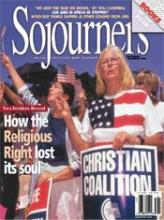Recently I’ve been irritated by the over-professionalization of American culture. We rely on professionals to bring us our music, our entertainment, even God—which causes our own creativity to wither, and leaves us lacking different ways to see the world. This is most prominent in the state of radio broadcasting today. But I find some hope for an opening of communications in the model of the church.
Most American radio today is a top-down form of communication—much like the Church in the Middle Ages. Then, Bibles were written in Latin, a language few people knew, and chained to the altars so only priests had access to them. Not until the Protestant Reformation and the invention of the printing press did people start getting direct access to the Word of God. Communication, which had been from God to priest to ordinary worshipper, was now opened up. The Reformation and the new mass communication tool of the printing press disrupted the hierarchy of the church.
Today, a similar response to the hierarchical control of the mass media is being generated through low-power radio. According to Felix Guattari, an Italian radio activist, "’popular free radio’...aims at changing the professionally mediated relationship between listener and speaker, and even challenging the listener/speaker dichotomy itself." In America, we generally accept radio as a one-way communications tool: We have music played at us and hundreds of ads beamed at us each day. The average listener rarely helps determine the actual content of a radio show.
With the low-power radio movement, this is beginning to change. People are realizing that, with a few hundred dollars, they can start their own radio stations, broadcasting to a radius of a couple of miles. They can invite their neighbors on the air to talk about local issues. They can play whatever music they want to hear. They can promote local causes. The standard communication order is being disrupted.
Read the Full Article
